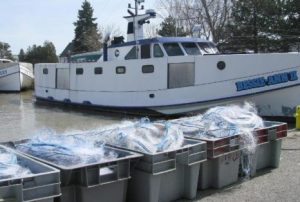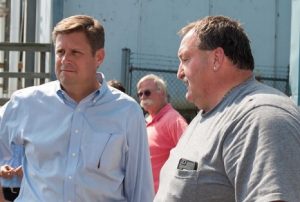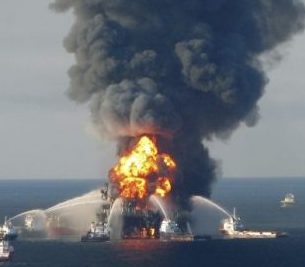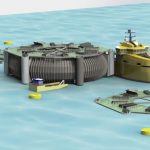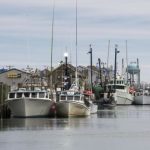Tag Archives: hypoxia
Long Island Sound Lost Its Lobster Fishery. Is Cape Cod Bay Next?
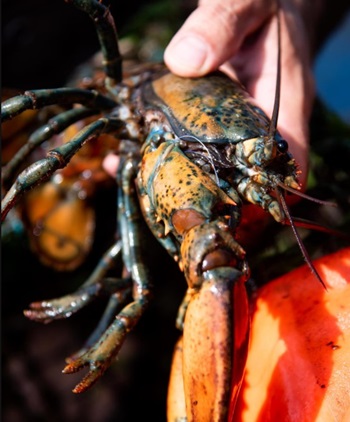 Catches in Cape Cod Bay were good for many years, and prices were good, too. But lobstermen here started worrying in the late 1990s when the fishery collapsed in Long Island Sound. And that worry hasn’t gone away, because environmental changes here resemble those that were affecting Long Island Sound back then. In the aftermath of Tropical Storm Floyd in August 1999, the lobsters in Long Island Sound started coming up dead or lethargic, not making it back to the docks alive. Fall landings for all Connecticut ports dropped between 91 and 99 percent that year, according to a joint report of the state’s dept. of environmental protection and marine fisheries office published in 2000. Fast forward 25 years: hopes for a Long Island Sound population rebound have not panned out. A December 2021 report in the Portland Press Herald introduced Michael Grimshaw this way: “Grimshaw is believed to be the last full-time commercial lobsterman in Connecticut.” His traps used to bring in up to a few thousand pounds a day, wrote reporter David Abel. A good day was now getting him 50 pounds, Grimshaw told him. more, >>CLICK TO READ<< By Capt. Mike Rathgeber 08:40
Catches in Cape Cod Bay were good for many years, and prices were good, too. But lobstermen here started worrying in the late 1990s when the fishery collapsed in Long Island Sound. And that worry hasn’t gone away, because environmental changes here resemble those that were affecting Long Island Sound back then. In the aftermath of Tropical Storm Floyd in August 1999, the lobsters in Long Island Sound started coming up dead or lethargic, not making it back to the docks alive. Fall landings for all Connecticut ports dropped between 91 and 99 percent that year, according to a joint report of the state’s dept. of environmental protection and marine fisheries office published in 2000. Fast forward 25 years: hopes for a Long Island Sound population rebound have not panned out. A December 2021 report in the Portland Press Herald introduced Michael Grimshaw this way: “Grimshaw is believed to be the last full-time commercial lobsterman in Connecticut.” His traps used to bring in up to a few thousand pounds a day, wrote reporter David Abel. A good day was now getting him 50 pounds, Grimshaw told him. more, >>CLICK TO READ<< By Capt. Mike Rathgeber 08:40
Lobstermen and Scientists See a Fishery in Flux
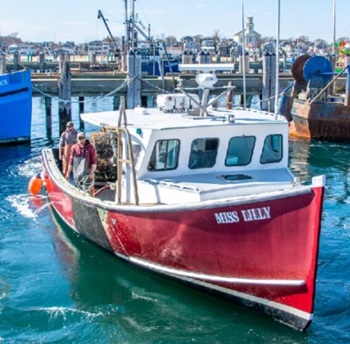 While overall the fishery seems stable, some lobstermen are seeing changes that have them worried about its future. Scientists are looking into what role the changing climate may be playing in those changes, but they don’t have definitive answers. “It’s horrible,” said Mike Rego, a lobsterman and owner of the F/V Miss Lilly who operates out of Provincetown. “Last year was the worst year I ever had.” Dana Pazolt, another Provincetown lobsterman who owns the F/V Black Sheep, said that the last four years have been slim for lobsters around the Outer Cape. “You’ve got to hunt for them,” he said. “I can’t tell you why that is.” The surface waters of the Gulf of Maine are warming at a rate of about one degree per decade, faster than 99 percent of the world’s oceans, according to the Gulf of Maine Research Institute. Meanwhile, in other areas, warming has already had an effect — it played a major role in causing the collapse of the lobster fishery in Long Island Sound in 1999. more, >>CICK TO READ<< 21:20
While overall the fishery seems stable, some lobstermen are seeing changes that have them worried about its future. Scientists are looking into what role the changing climate may be playing in those changes, but they don’t have definitive answers. “It’s horrible,” said Mike Rego, a lobsterman and owner of the F/V Miss Lilly who operates out of Provincetown. “Last year was the worst year I ever had.” Dana Pazolt, another Provincetown lobsterman who owns the F/V Black Sheep, said that the last four years have been slim for lobsters around the Outer Cape. “You’ve got to hunt for them,” he said. “I can’t tell you why that is.” The surface waters of the Gulf of Maine are warming at a rate of about one degree per decade, faster than 99 percent of the world’s oceans, according to the Gulf of Maine Research Institute. Meanwhile, in other areas, warming has already had an effect — it played a major role in causing the collapse of the lobster fishery in Long Island Sound in 1999. more, >>CICK TO READ<< 21:20
Lobstermen Face Hypoxia in Outer Cape Waters
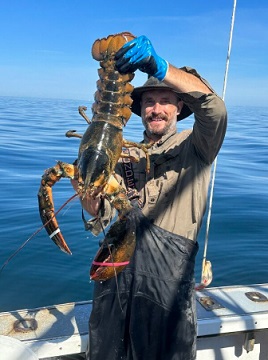 Alex Iacono, a lobsterman who says he favors lobsters and ocean solitude over people, is worried about the future of his business. Iacono, who lives in Truro and fishes out of Provincetown on the F/V Storm Elizabeth, says his catch has significantly dwindled in recent years. He’s not alone; other lobstermen working across Cape Cod Bay have noticed a downward trend. They believe that hypoxia — dangerously low levels of oxygen in the water — is to blame. Hypoxia first came to fishermen’s attention in 2019 when it caused a catastrophic lobster die-off in the bay. After that, the DMF started affixing sensors to buoys and traps to monitor oxygen levels, and they have consistently observed mild hypoxia since then. >click to read< 09:50
Alex Iacono, a lobsterman who says he favors lobsters and ocean solitude over people, is worried about the future of his business. Iacono, who lives in Truro and fishes out of Provincetown on the F/V Storm Elizabeth, says his catch has significantly dwindled in recent years. He’s not alone; other lobstermen working across Cape Cod Bay have noticed a downward trend. They believe that hypoxia — dangerously low levels of oxygen in the water — is to blame. Hypoxia first came to fishermen’s attention in 2019 when it caused a catastrophic lobster die-off in the bay. After that, the DMF started affixing sensors to buoys and traps to monitor oxygen levels, and they have consistently observed mild hypoxia since then. >click to read< 09:50
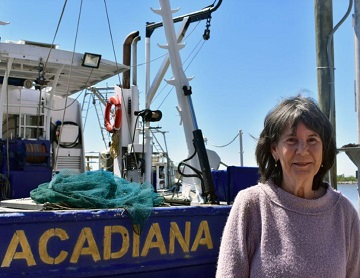
A lifetime of research links Gulf of Mexico ‘dead zone’ to Midwest fertilizer runoff
In the summer of 1985, Nancy Rabalais set sail on a research vessel into the Gulf of Mexico — and into the scientific unknown. Over nearly four decades, Rabalais has become a giant in her field. She has completed hundreds of interviews with journalists, presented a TED Talk, testified to Congress multiple times, mentored countless students at LSU and published nearly 160 studies. Now 73, Rabalais said she doesn’t plan to go on the research cruises anymore due to her age and health issues. She remains engaged in her work, even as she trains a new generation of scientists to take over. >click to read< 10:04
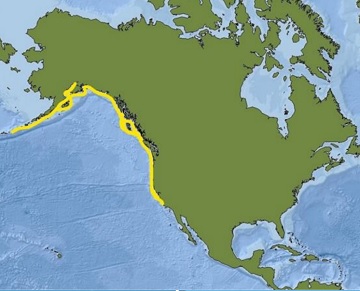
Dungeness crab die-off underway along US West Coast
An important species of crab found primarily along the West Coast is fighting off a combination of stressors that experts at the North Atlantic and Atmospheric Administration say has fishermen finding piles of dead shellfish, and the impacts are affecting the economy. Dungeness crabs are typically found along water beds, and their harvest can be worth a quarter-billion dollars annually. NOAA Fisheries believes the combination of a lack of oxygen, harmful algal blooms, water temperatures and ocean acidification are playing a role in the animal’s disappearance. >click to read< 16:12
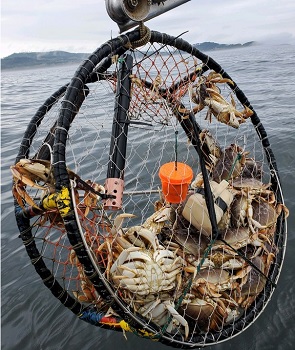
Pacific Coast crabs are suffocating
The crab pots are piled high at the fishing docks in Newport, Oregon. Stacks of tire-sized cages fill the parking lot, festooned with colorful buoys and grimy ropes. By this time in July, most commercial fishers have called it a year for Dungeness crab. But not fisherman Dave Bailey,,, Recent years have also brought outbreaks of domoic acid, which renders crab unsafe to eat, and increasing incidents of humpback whales getting tangled in crab gear. However, there’s another emerging problem that threatens not only Bailey’s livelihood but the very ecosystem that sustains it. I’ve come today to see 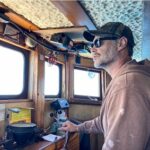 a tool that could help crabbers manage. On the counter in the kitchenette, amid bowls of instant noodles and tinned oysters, Bailey shows me a sturdy black tube, about 60 centimeters long, that fits neatly inside a crab pot. Photos, video, >click to read< 13:25
a tool that could help crabbers manage. On the counter in the kitchenette, amid bowls of instant noodles and tinned oysters, Bailey shows me a sturdy black tube, about 60 centimeters long, that fits neatly inside a crab pot. Photos, video, >click to read< 13:25


































